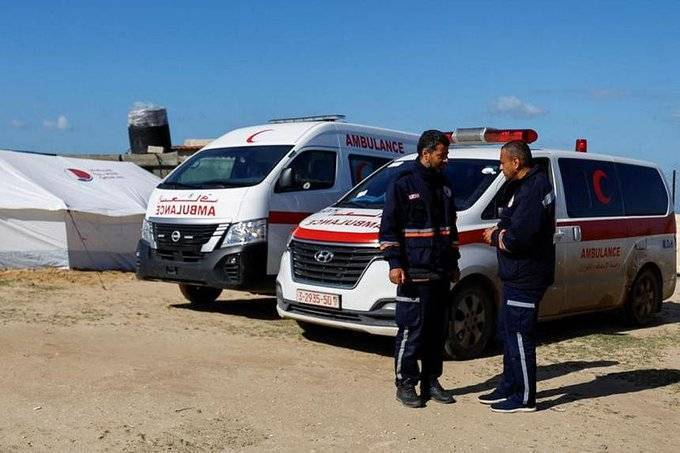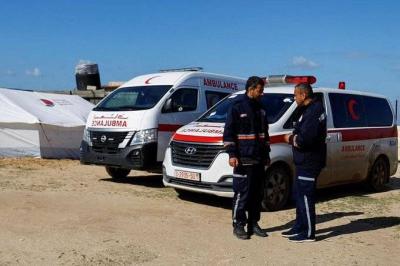An ambulance left its usual location at Nasser Hospital in Khan Yunis six days ago, carrying the largest possible supply of bandages, syringes, and other essentials, with everything the crew managed to gather to operate the vehicle as a mobile clinic since then, due to the lack of a route to return. The hospital, the largest still operational in southern Gaza, is located in an area experiencing fierce fighting between Israeli forces and the armed fighters of the Palestinian Islamic Resistance Movement (Hamas), making the passage for patients or even ambulances extremely dangerous.
Paramedic Naseem Hassan, who heads the emergency unit at Nasser Hospital, stated that they are now functioning as a field medical point in the center of Khan Yunis. This means treating patients who arrive with the available resources or swiftly picking up casualties, including those injured in very close proximity to the front lines, and transferring them to tents equipped with basic medical facilities.
Hassan added that they have been working since their departure six days ago and that there are numerous injuries among the displaced who were in the industrial area and some schools. He noted that they have been unable to treat several injured persons who arrived by carts, tuk-tuks, cars, or even on foot.
Khan Yunis witnessed a massive influx of displaced individuals in the early weeks of the war between Israel and Hamas, following an Israeli military request for civilians to evacuate northern Gaza for their safety. Since then, the fighting has shifted southward into the heart of the city, leading to new waves of displacement towards Rafah, on Gaza's southern border with Egypt, making conditions harsher and more dangerous for those left in Khan Yunis.
Hassan is worried about running out of essential supplies, with no immediate opportunity to obtain new supplies from any hospital stock. While sorting through the supplies stored inside the ambulance, he said, "There are only one or two clot-stopping bandages left."
In one of the medical tents where the ambulance transports patients, paramedic Ibrahim Abu Al-Kass is doing his utmost to manage a wide range of injuries and illnesses using only the basic tools available to him. Abu Al-Kass stated that "this medical point was established after hospitals like Nasser Hospital and Al-Amal became besieged and difficult to access under the current events." He added that they are facing very critical cases that are difficult to treat even in a fully equipped hospital.
Hassan and his colleagues, from the ambulance crews operating as mobile clinics, transfer patients to the tent and carry out bodies from it. The war began after the October 7 attack, which resulted in 1,200 deaths and 240 kidnappings, according to Israeli data, leading to a comprehensive military assault on the densely populated sector. Israeli bombing and ground invasion have killed at least 26,900 Palestinians and injured over 65,900 others, according to data from the Gaza Ministry of Health. It has also caused the displacement of most of the sector's population and the spread of hunger and disease. Most hospitals have completely stopped functioning or are operating under harsh conditions, lacking medications and equipment while facing a continuous influx of severely injured persons and displaced individuals seeking shelter in their buildings.




